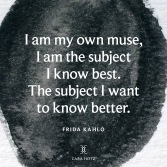A little while back, my friend Dan wrote a post about his muse. I’ve been mentally returning to it since then, mostly because I don’t think I completely understand what a muse is.
I know, a writer with a fuzzy muse sounds like a serious and, um, personal problem.
I thought I understood the muse – it’s the inspiration, the passion, the thing that gets you fired up to write. It’s the whole reason you do the thing.
Maybe.
If you read Dan’s post, you’ll see his muse isn’t an ethereal presence or abstract idea. He didn’t get up one morning and decide to write about the Buccaneers because they get him fired up. His muse is a specific person or group of people – real, flesh and blood readers with lives and hobbies and opinions.
Having read Dan’s work, this surprised me. His book Savvy Stories is a humorous memoir about the early years of his daughter’s life. Before reading his post, if you’d asked me who his muse was for that book, I would have said his daughter, obviously. It’s about her. She was the inspiration.
And I would have been wrong.
Dan writes with a specific audience in mind – in the case of Savvy Stories, his muse was a group of high school friends. He considered how they would read and interpret the story. The potential audience inspired him to write the story.
Which makes sense. If we don’t have an audience, who are we writing for?
I think I finally “got it” this morning as I was chewing on the story of the YA urban fantasy novel I’m cleaning up for querying or self-publishing purposes. YA means young adult, meaning the story is geared for teenagers.
This is my fifth YA novel – the first three are part of a series currently with a small publishing house, and let’s call the fourth one a practice that will never see the light of day. This fifth one started as a short story but quickly outgrew the short story criteria. It’s about a sixteen-year-old boy who survives a global killing virus, along with a small handful of other teens. Instead of dying, they develop the ability to shapeshift into flying creatures and have to figure out their new world.
It might sound fantastical, but it shares some common themes with the other YAs I’ve written. My characters find themselves in situations where they feel different and alone. They deal with issues real teens face (though perhaps in a more dramatic fashion) – school, parents, depression, sex, bullying, and even gangs, among others. Their stories lie in how they deal with these things.
So what inspired me to write these stories? What was my muse?
My sons are seven and ten years old. I know that I’ll blink and they’ll suddenly be teenagers. I don’t think I realized it as I was writing, but I told the stories for them, especially this shapeshifting story. A while back, when I searched for examples of male POV protags in YA literature, I noticed there were very few. The vast majority of YA features a female protag. It’s not a bad thing, necessarily. Statistically, girls are more likely to read for fun into their teenage years than boys are, and many of these protags show girls and women in empowering positions. I’m all for that.
But
Where does that leave our boys? My boys? Will they stop reading for fun simply because of the lack of material written for them? Sure, they can read the girl protag YA. I know several boys who are fans of The Hunger Games. But it’s not the same as rooting for an MC they can easily relate to. Teenage boys often have to choose between comic books, adult fantasy novels, or this standard YA if they want to read for fun.
I think my subconscious knew my boys are my muse before I did. When I started writing the trilogy – which features two protags, a brother and sister – I thought the stories would mostly be about the sister. I’m a girl, after all, and it makes sense that it would be easier for me to write her. Being the pantser that I am, I realized as the stories developed that they are really the brother’s stories. The sister has her own arc, especially in the third book, which readers could argue is both hers and his, but the major driver of the stories is the brother.
 So for the YAs, my sons are my muse. For The Fourth Descendant, I indulged in my own loves of history and mystery. My muse wasn’t a specific person. It was other readers like me.
So for the YAs, my sons are my muse. For The Fourth Descendant, I indulged in my own loves of history and mystery. My muse wasn’t a specific person. It was other readers like me.
What about you? Do you consider specific readers when you write? Do you consider them your muse?


Speaking as someone who does not do anything without an actual muse – ie person as source of inspiration, I do not think it clarifies anything to try to change the definition.
LikeLike
It’s not so much a changed definition as a different way to look at the concept. By all means, define and use it however it works for you. 🙂
LikeLike
“Write to please just one person. If you open a window and make love to the world, so to speak, your story will get pneumonia.” ― Kurt Vonnegut.
I believe this to be a similar sentiment.
LikeLiked by 1 person
As a mom of three boys, I really enjoyed this post. I’m looking forward to the day they’re old enough to read your books!
LikeLiked by 1 person
Awesome! How old are they?
LikeLiked by 2 people
5, 7 and 9 🙂
LikeLiked by 1 person
Your boys are very lucky to have you as their mom.
Great post. Very touching.
LikeLiked by 1 person
Thanks. 🙂
LikeLiked by 1 person
Interesting point! I’ve always been anti-Muse–anti the ideas of canned inspiration and waiting-for-the-right-moment the Muse often implies. But the idea of the Muse as a specific group of people you’re writing for? I like that. I don’t know if Muse is quite the word I’d use–I’ve always heard ‘intended audience’ in this context–but it’s got a nice solid backing of real world to it, and might actually help folks focus their writing a little bit better. I’m a fan.
My muse–though I don’t know how often he actually reads my stuff–is an old friend of mine, close to my age, whose sense of humor is very similar to mine. In a way, the stuff he likes is so similar to what I like I guess I’m writing to indulge myself–but he’s the person whose reaction I find myself thinking of when I write something down, especially if it’s a joke.
LikeLiked by 2 people
It does feel more personal than “intended audience”, doesn’t it? Before, I thought of it the same way as you – I’d offer a blank stare if someone asked what my muse was. But it makes sense that the audience drives us.
I’d argue all of our writing is at least a little self indulgent. It wouldn’t be much fun otherwise. 🙂
LikeLiked by 1 person